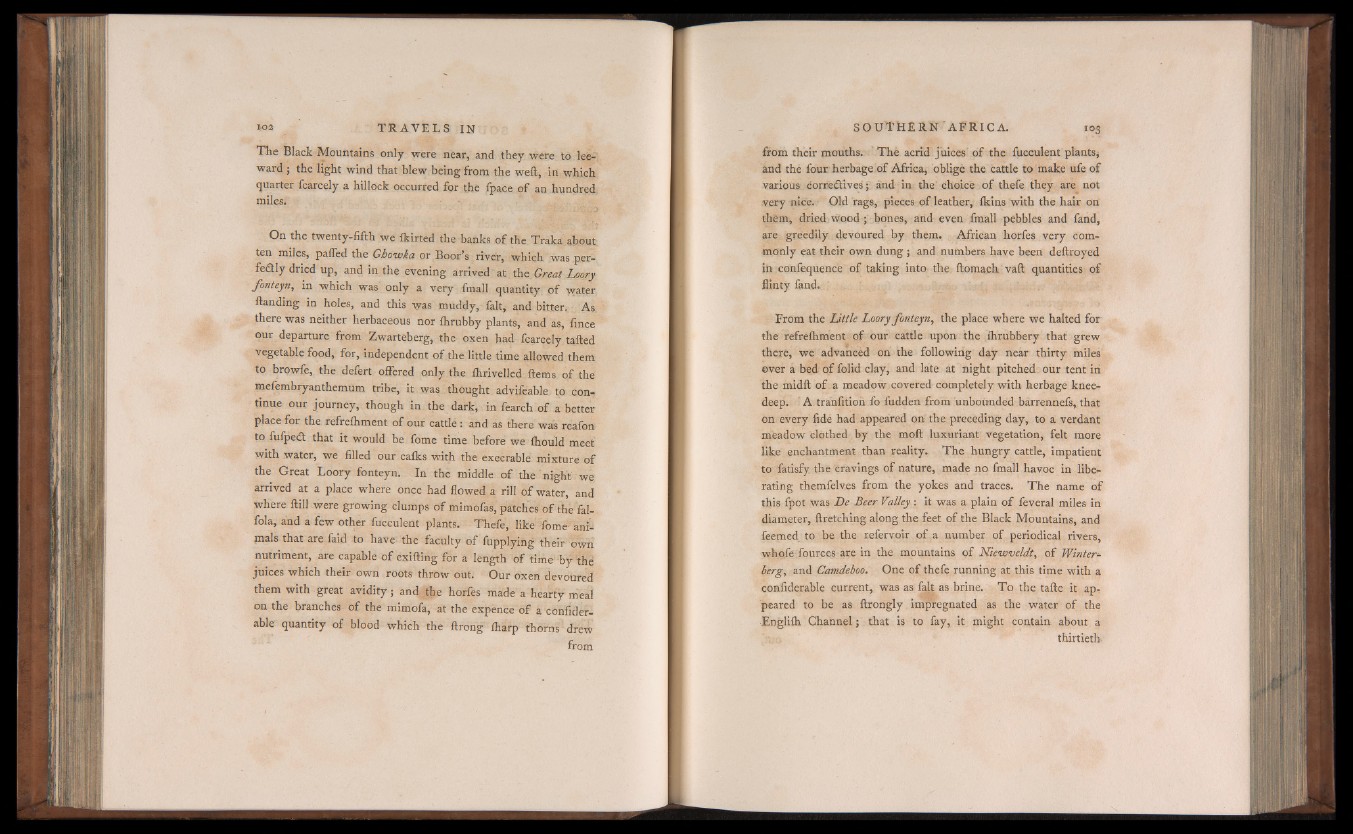
The Black Mountains only were near, and they were to leeward
; the light wind that blew being from the weft, in which
quarter fcarcely a hillock occurred for the lpace of an hundred
miles.
On the twenty-fifth we ikirted the banks of the Traka about
ten miles, paffed the Ghowka or Boor’s river, which was per-
fedtly dried up, and in the evening arrived at the Great Loory
fonteyn, in which was only a very fmall quantity of water
Handing in holes, and this was muddy, fait, and bitter. As:
there was neither herbaceous nor fhrubby plants, and as, fince
our departure from Zwarteberg, the oxen had fcarcely tailed
vegetable food, for, independent of the little time allowed them
to browfe, the defert offered only the Ihrivelled items of the
mefembryanthemum tribe, it was thought advifeable to continue
our journey, though in the dark, in fearch o f a better
place for the refreihment of our cattle : and as there was reafon
to fufpe£t that it would be fome time before we ihould meet
with water, we filled our caiks with the execrable mixture of
the Great Loory fonteyn. In the middle o f the night we
arrived at a place where once had flowed a rill of water, and
where ftill were growing clumps of mimofas, patches o f the fal-
fola, and a few other fucculent plants. Thefe, like fome animals
that are faid to have the faculty of fupplying their own
nutriment, are capable o f exifting for a length o f time by the
juices which their own roots throw out. Our oxen devoured
them with great avidity ; and the horfes made a hearty meal
on the branches o f the mimofa, at the expènce of a confider-
able quantity of blood which the ftrong iharp thorns drew
from
from their mouths. Thè acrid juices of the fucculent plants,
and thé four herbage of Africa, obligé the cattle to make ufe of
various correûives ; and in the' choicè o f thefe they are not
very nice. Old rags, pieces of leather, ikins with the hair on
them, dried wood ; bones, and even fmall pebbles and fand,
are greedily devoured by them. African horfes very commonly
eat their own dung ; and numbers have been deftroyed
in confequence of taking into the ftomach vaft quantities of
flinty fand.
From the Little Loory fonteyn, the place where we halted for
the refreihment of our cattle upon the ihrubbery that grew
there, we advanced on the following day near thirty miles
over a bed of folid clay, and late at night pitched our tent iri
the midft of a meadow covered completely with herbage knee-
deep. A tranfition fo fudden from unbounded barrenneisr that
on every fide had appeared on the preceding day, to a verdant
meadow clothed by the moft luxuriant vegetation, felt more
like enchantment than reality. The hungry cattle, impatient
to fatisfy. the cravings of nature, made no fmall havoc in libe*-
rating themfelves from the yokes and traces. The name of
this fpot was De Beer Valley : it was a plain of feveral miles in
diameter, ftretching along the feet of the Black Mountains, and
feemed to be the refervoir o f a number of periodical rivers,
whole fourccs are in the mountains of Niewveldt, o f Winter-
berg, and Camdeboo. One of thefe running at this time with a
confiderable current, was as falj as brine. To the tafte it appeared
to be as ftrongly impregnated as the water o f the
Englilh Channel ; that is to fay, it might contain about a
thirtieth